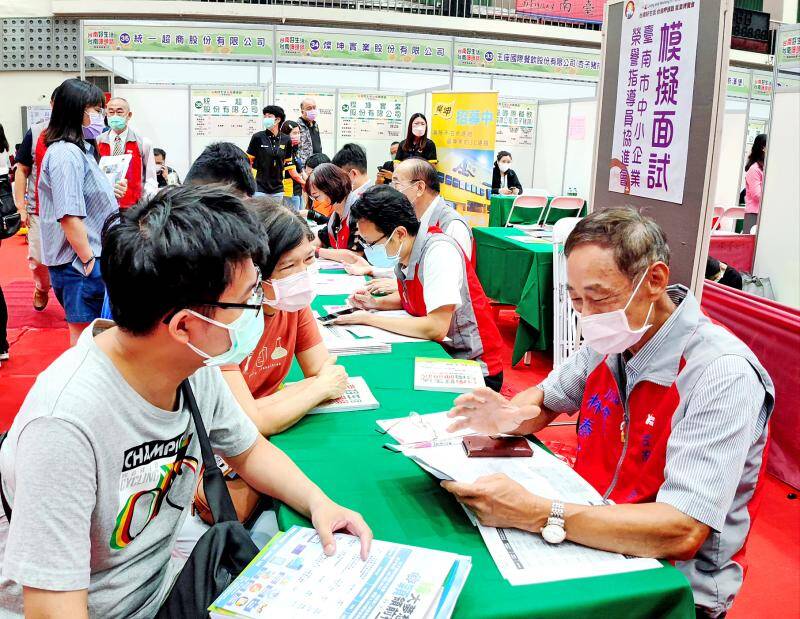Local companies believe that nearly a third of all job opportunities will vanish in 10 years due to the rise of artificial intelligence (AI), according to a survey released by online job bank yes123 on Tuesday.
In the survey of 1,016 companies on the labor market’s third quarter outlook, the job bank focused in part on AI’s impact on workers and asked companies what percentage of jobs they felt would be lost to AI’s round-the-clock productivity and high-speed computing prowess.
Respondents felt on average that 29.2 percent of job opportunities would be lost to AI over the next 10 years, but there were no suggestions on what would replace those jobs.

Photo: Wu Chun-feng, Taipei Times
The job bank also asked companies to identify the labor- intensive and knowledge-intensive fields of endeavor in which people were most likely to lose their jobs to AI.
Among labor-intensive disciplines, the most likely job to vanish according to companies was ticket selling, cited by 54.3 percent of respondents.
It was followed by call center agents (53.6 percent), assembly line workers (52.2 percent), gas station attendants (35.7 percent), and wholesale and convenience store clerks (34.8 percent).
The top five vulnerable knowledge-intensive jobs, meanwhile, were translators (37.2 percent), journalists (36.3 percent), bank clerks (35.2 percent), financial traders (29.1 percent), and insurance agents (28.2 percent).
In addition, a total of 49.8 percent of companies indicated that they are considering adopting automation or AI, a significant increase from last year’s survey result of 42 percent, yes123 said.
Among them, 19.6 percent reported that related AI projects are already in progress, with expectations that employees possessing relevant skills will have an average starting salary at least 31.6 percent higher than others.
Bingo Yang (楊宗斌), a spokesman for yes123, said the job market was heading toward “human-machine collaboration,” or workers directly supported by AI to achieve task objectives.
That way, AI can handle tasks that require high precision and repetition, allowing workers to engage in more creative work, Yang said.
The online survey, conducted June 7-20, had a confidence level of 95 percent and a margin of error of ± 3.07 percent, according to yes123.

Taiwan Semiconductor Manufacturing Co (TSMC, 台積電) last week recorded an increase in the number of shareholders to the highest in almost eight months, despite its share price falling 3.38 percent from the previous week, Taiwan Stock Exchange data released on Saturday showed. As of Friday, TSMC had 1.88 million shareholders, the most since the week of April 25 and an increase of 31,870 from the previous week, the data showed. The number of shareholders jumped despite a drop of NT$50 (US$1.59), or 3.38 percent, in TSMC’s share price from a week earlier to NT$1,430, as investors took profits from their earlier gains

In a high-security Shenzhen laboratory, Chinese scientists have built what Washington has spent years trying to prevent: a prototype of a machine capable of producing the cutting-edge semiconductor chips that power artificial intelligence (AI), smartphones and weapons central to Western military dominance, Reuters has learned. Completed early this year and undergoing testing, the prototype fills nearly an entire factory floor. It was built by a team of former engineers from Dutch semiconductor giant ASML who reverse-engineered the company’s extreme ultraviolet lithography (EUV) machines, according to two people with knowledge of the project. EUV machines sit at the heart of a technological Cold

AI TALENT: No financial details were released about the deal, in which top Groq executives, including its CEO, would join Nvidia to help advance the technology Nvidia Corp has agreed to a licensing deal with artificial intelligence (AI) start-up Groq, furthering its investments in companies connected to the AI boom and gaining the right to add a new type of technology to its products. The world’s largest publicly traded company has paid for the right to use Groq’s technology and is to integrate its chip design into future products. Some of the start-up’s executives are leaving to join Nvidia to help with that effort, the companies said. Groq would continue as an independent company with a new chief executive, it said on Wednesday in a post on its Web

CHINA RIVAL: The chips are positioned to compete with Nvidia’s Hopper and Blackwell products and would enable clusters connecting more than 100,000 chips Moore Threads Technology Co (摩爾線程) introduced a new generation of chips aimed at reducing artificial intelligence (AI) developers’ dependence on Nvidia Corp’s hardware, just weeks after pulling off one of the most successful Chinese initial public offerings (IPOs) in years. “These products will significantly enhance world-class computing speed and capabilities that all developers aspire to,” Moore Threads CEO Zhang Jianzhong (張建中), a former Nvidia executive, said on Saturday at a company event in Beijing. “We hope they can meet the needs of more developers in China so that you no longer need to wait for advanced foreign products.” Chinese chipmakers are in